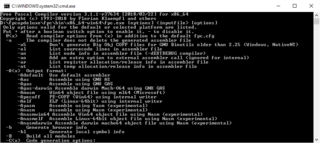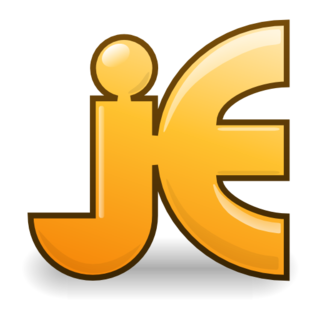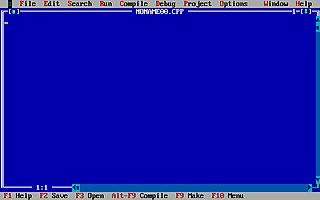Related Research Articles

An integrated development environment (IDE) is a software application that provides comprehensive facilities to computer programmers for software development. An IDE normally consists of at least a source code editor, build automation tools and a debugger. Some IDEs, such as NetBeans and Eclipse, contain the necessary compiler, interpreter, or both; others, such as SharpDevelop and Lazarus, do not.
Turbo Pascal is a software development system that includes a compiler and an integrated development environment (IDE) for the Pascal programming language running on CP/M, CP/M-86, and DOS. It was originally developed by Anders Hejlsberg at Borland, and was notable for its extremely fast compiling times. Turbo Pascal, and the later but similar Turbo C, made Borland a leader in PC-based development.
C++Builder is a rapid application development (RAD) environment, originally developed by Borland and as of 2009 owned by Embarcadero Technologies, for writing programs in the C++ programming language currently targeting Windows, iOS and for several releases, macOS and Android C++Builder combines the Visual Component Library and IDE written in Object Pascal with multiple C++ compilers. Most components developed in Delphi can be used in C++Builder with no or little modification, although the reverse is not true, but this constraint is valid only for source code. Binary code generated by Delphi can easily be linked to binary code generated by C++Builder and vice versa to generate an executable written in both Object Pascal and C++. With this approach, C++ can be called from Object Pascal and vice versa. Since both Delphi and C++ use the same back end linker, the debugger can single step from Delphi code into C++ transparently.
Delphi is a software product that uses the Delphi dialect of the Object Pascal programming language and provides an integrated development environment (IDE) for rapid application development of desktop, mobile, web, and console software, currently developed and maintained by Embarcadero Technologies.
Object Pascal is an extension to the programming language Pascal that provides object-oriented programming (OOP) features such as classes and methods.

Free Pascal Compiler (FPC) is a compiler for the closely related programming-language dialects Pascal and Object Pascal. It is free software released under the GNU General Public License, with exception clauses that allow static linking against its runtime libraries and packages for any purpose in combination with any other software license.

HomeSite was an HTML editor originally developed by Nick Bradbury. Unlike WYSIWYG HTML editors such as FrontPage and Dreamweaver, HomeSite was designed for direct editing, or "hand coding", of HTML and other website languages.

jEdit is a free software text editor available under GPL-2.0-or-later. It is written in Java and runs on any operating system with Java support, including BSD, Linux, macOS and Windows.
Borland Kylix is a compiler and integrated development environment (IDE) formerly sold by Borland, but later discontinued. It is a Linux software development environment based on Borland Delphi and Borland C++ Builder, which runs under Microsoft Windows. Continuing Delphi's classical Greek theme, Kylix is the name for an ancient Greek drinking cup. The closest supported equivalent to Kylix is the free Lazarus IDE package, designed to be code-compatible with Delphi. As of 2010 the project has been resurrected in the form of Delphi cross compiler for Mac and Linux, as shown in the Embarcadero's Delphi and C++ Builder roadmap. As of September 2011 with Kylix discontinued the framework for cross-platform development by Embarcadero is FireMonkey.

A source-code editor is a text editor program designed specifically for editing source code of computer programs. It may be a standalone application or it may be built into an integrated development environment (IDE) or web browser. Source-code editors are a fundamental programming tool, as the fundamental job of programmers is to write and edit source code.

A class browser is a feature of an integrated development environment (IDE) that allows the programmer to browse, navigate, or visualize the structure of object-oriented programming code.

Turbo C++ is a discontinued C++ compiler and integrated development environment originally from Borland. It was designed as a home and hobbyist counterpart for Borland C++. As the developer focused more on professional programming tools, later Turbo C++ products were made as scaled down versions of its professional compilers.
Microsoft QuickC is a discontinued commercial integrated development environment (IDE) product engineered by Microsoft for the C programming language, superseded by Visual C++ Standard Edition. Its main competitor was Borland Turbo C.
Borland C++ is a C and C++ IDE for MS-DOS and Microsoft Windows. It was the successor to Turbo C++ and included a better debugger, the Turbo Debugger, which was written in protected mode DOS.
Turbo Delphi is a discontinued integrated development environment (IDE), created by CodeGear, which was targeted towards student, amateur, individual professionals, and hobbyist programmers. It used the Delphi programming language, which is a dialect of Object Pascal.
The following tables list notable software packages that are nominal IDEs; standalone tools such as source code editors and GUI builders are not included. These IDEs are listed in alphabetical order of the supported language.
SlickEdit, previously known as Visual SlickEdit, is a cross-platform commercial source code editor, text editor, code editor and Integrated Development Environment developed by SlickEdit, Inc. SlickEdit supports Integrated Debuggers for GNU C/C++, Java, WinDbg, Clang C/C++ LLDB, Groovy, Google Go, Python, Perl, Ruby, PHP, Xcode, and Android JVM/NDK. SlickEdit includes such features as built in beautifiers that can beautify code as you type, code navigation, context tagging, symbol references, third party tool integration, DiffZilla, syntax highlighting, and over 13 keyboard emulations.

Brief, is a once-popular programmer's text editor in the 1980s and early 1990s. It was originally released for MS-DOS, then IBM OS/2 and Microsoft Windows. The Brief interface and functionality live on, including via the SourceForge GRIEF editor.
The Wing Python IDE family of integrated development environments (IDEs) from Wingware was created specifically for the Python programming language. These lightweight but full-featured Python IDEs are designed to speed up writing, debugging, and testing code, to reduce the incidence of coding errors, and to make it easier to understand and navigate Python code.
This page details the history of the programming language and software product Delphi.
References
- ↑ Larry Ayers (June 2000). "Visual SlickEdit 5.0". Linux Journal.
- ↑ James R. Borck (June 2, 2000). "Kawa IDE offers no-frills Java development". JavaWorld.
* CodeWright editing features
- ↑ "CodeWright Fusion for MSVC++". Computerworld . December 5, 1995. p. 6.
- ↑ "New Products: Premia Corporation, 32 bit CodeWright Fusion". Dr. Dobb's. July 1, 1995.
- ↑ An Open Letter to CodeWright Customers